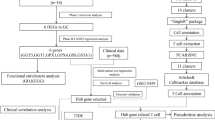Abstract
Guanylyl cyclase C (GCC) is expressed exclusively in normal intestinal mucosal cells, primary and metastatic colorectal cancers (CRC). The aim of this study was to determine the possible association between the GCC expressions in peripheral blood, prognostic parameters and response to chemotherapy in CRC patients. Fourty-nine metastatic CRC patients and 41 healthy controls with similar age and sex were included to this study. Peripheral blood GCC expressions are measured by the reverse transcriptase-polymerase chain reaction (RT-PCR) method. Interstingly, no GCC expression was measured in healthy controls but GCC expressions of the patients were detectable. Although there was a significant reduction in GCC expressions in 30 patients with regression (from 5.46 ± 4.12 to 0.06 ± 0.03, p < 0.0001), marked increase in GCC expressions was observed in 19 patients with progression following chemotherapy (from 0.43 ± 0.19 to 1.38 ± 0.52, p = 0.0174). Significant correlation was found between the GCC expressions and carbohydrate antigen 19–9 (CA19-9) levels (p = 0.0041) in 30 patients with regression before chemotherapy. Marked correlation was also detected between the GCC expressions and carcinoembryonic antigen (CEA) levels (p = 0.0072) in 19 patients with progression before chemotherapy. The results of the present study suggest that peripheral blood GCC expressions along with CEA and CA19-9 can be used to determine the early respose to chemotherapy in patients with metastatic CRC. These findings imply that higher expression of GCC in peripheral blood seems to be an indicator of good therapeutic response to chemotherapy and remission. Monitoring the peripheral blood GCC expressions may allow employing different treatment options to metastatic CRC patients.


Similar content being viewed by others
References
Bosset JF, Collette L, Calais G, et al. Chemotherapy with preoperative radiotherapy in rectal cancer. N Engl J Med. 2006;355:1114–23.
Ferlay J, Shin HR, Bray F, Forman D, Mathers C, Parkin DM. Estimates of worldwide burden of cancer in 2008: GLOBOCAN 2008. Int J Cancer. 2010;127:2893–917.
Tatar M, Tatar F. Colorectal cancer in Turkey: current situation and challenges for the future. Eur J Health Econ. 2010;10:99–105.
Wilson PM, Labonte MJ, Lenz HJ. Molecular markers in the treatment of metastatic colorectal cancer. Cancer J. 2010;16:262–72.
Yamashita K, Watanabe M. Clinical significance of tumor markers and an emerging perspective on colorectal cancer. Cancer Sci. 2009;100:195–9.
Bełtowski J. Guanylin and related peptides. J Physiol Pharmacol. 2001;52:351–75.
Forte LR. A novel role for uroguanylin in the regulation of sodium balance. J Clin Invest. 2003;112:1138–41.
Padayatti PS, Pattanaik P, Ma X, van den Akker F. Structural insights into the regulation and the activation mechanism of mammalian guanylyl cyclases. Pharmacol Ther. 2004;104:83–99.
Camici M. Guanylin peptides and colorectal cancer (CRC). Biomed Pharmacother. 2008;62:70–6.
Liu D, Overbey D, Watkinson LD, et al. In vivo imaging of human colorectal cancer using radiolabeled analogs of the uroguanylin peptide hormone. Anticancer Res. 2009;29:3777–83.
Cagir B, Gelmann A, Park J, et al. Guanylyl cyclase C messenger RNA is a biomarker for recurrent stage II colorectal cancer. Ann Intern Med. 1999;131:805–12.
Carrithers SL, Parkinson SJ, Goldstein SD, Park PK, Urbanski RW, Waldman SA. Escherichia coli heat-stable enterotoxin receptors. A novel marker for colorectal tumors. Dis Colon Rectum. 1996;39:171–81.
Waldman SA, Cagir B, Rakinic J, et al. Use of guanylyl cyclase C for detecting micrometastases in lymph nodes of patients with colon cancer. Dis Colon Rectum. 1998;41:310–5.
Schulz S, Hyslop T, Haaf J, et al. A validated quantitative assay to detect occult micrometastases by reverse transcriptase-polymerase chain reaction of guanylyl cyclase C in patients with colorectal cancer. Clin Cancer Res. 2006;12:4545–52.
Saif MW, Chu E. Biology of colorectal cancer. Cancer J. 2010;16:196–201.
Bustin SA, Gyselman VG, Williams NS, Dorudi S. Detection of cytokeratins 19/20 and guanylyl cyclase C in peripheral blood of colorectal cancer patients. Br J Cancer. 1999;79:1813–20.
Tien YW, Chang KJ, Jeng YM, et al. Tumor angiogenesis and its possible role in intravasation of colorectal epithelial cells. Clin Cancer Res. 2001;7:1627–32.
Guarino A, Cohen MB, Overmann G, Thompson MR, Giannella RA. Binding of E. coli heat-stable enterotoxin to rat intestinal brush borders and to basolateral membranes. Dig Dis Sci. 1987;32:1017–26.
Drewett JG, Garbers DL. The family of guanylyl cyclase receptors and their ligands. Endocr Rev. 1994;15:135–62.
Carrithers SL, Parkinson SJ, Goldstein S, Park P, Robertson DC, Waldman SA. Escherichia coli heat-stable toxin receptors in human colonic tumors. Gastroenterology. 1994;107:1653–61.
Carrithers SL, Barber MT, Biswas S, et al. Guanylyl cyclase C is a selective marker for metastatic colorectal tumors in human extraintestinal tissues. Proc Natl Acad Sci U S A. 1996;93:14827–32.
Chang C, Marszlowicz G, Waldman Z, et al. Guanylyl cyclase C as a biomarker for targeted imaging and therapy of metastatic colorectal cancer. Biomark Med. 2009;3:33–45.
Liefers GJ, Cleton-Jansen AM, van de Velde CJ, et al. Micrometastases and survival in stage II colorectal cancer. N Engl J Med. 1998;339:223–8.
Acknowledgment
This study was supported by a project (BAP TF.09.11) from the University of Gaziantep.
Author information
Authors and Affiliations
Corresponding author
Rights and permissions
About this article
Cite this article
Camci, C., Şahin, A., Sevinc, A. et al. Peripheral blood guanylyl cyclase c (GCC) expressions are associated with prognostic parameters and response to therapy in colorectal cancer patients. Tumor Biol. 32, 1265–1270 (2011). https://doi.org/10.1007/s13277-011-0231-0
Received:
Accepted:
Published:
Issue Date:
DOI: https://doi.org/10.1007/s13277-011-0231-0




